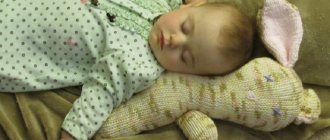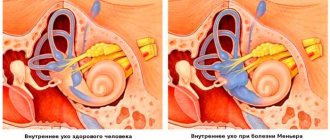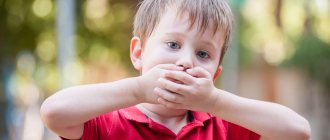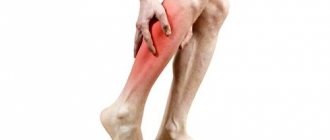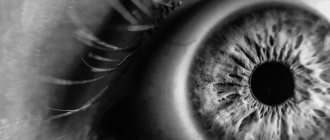The birth of a baby is always a joy for young parents. Naturally, all the attention of the mother and father is focused on the child. They can't get enough of how well he eats, sleeps and smiles back at them.
- Causes of lower lip tremor in babies
- Complications and consequences of tremor
- What measures should be taken if a baby’s lower lip is shaking?
But when the baby starts crying and the parents notice their lips trembling, they become alarmed. Therefore, we will look at why a newborn’s lower lip is shaking.
Causes of lower lip tremor in babies
Often mothers notice that their child’s lower lip shakes when the baby is at rest. And here the parents begin to panic. The thought immediately pops into their head that their little one is seriously ill with something.
Tremor is a shaking associated with involuntary contraction of the mental, triangular and quadratus muscles of the lower lip. Now let's look at the reasons for the formation of tremors from the norm and pathology.
- Response to stimuli (cold, stress, loud sound, sudden influx of bright light).
- When a newborn is stressed, an uncontrolled amount of norepinephrine is released from the adrenal cortex, which enters the bloodstream. NA causes vasospasm and contraction of smooth muscle tissue.
- An underdeveloped central nervous system is unable to regulate the baby's movements.
Among the stressful situations why a newborn's lower lip shakes, one can highlight: bathing, intestinal colic (pain), the moment of changing clothes, a state of hunger, and ordinary fatigue.
- Involuntary muscle contraction at rest.
- Joint trembling of the chin and lower lip, limbs, head.
- Frequently recurring tremors.
- After three months of age, trembling becomes more frequent.
The causes of pathological tremor are:
- prematurity (in premature children, trembling is observed up to 1.5-2 years);
- stress during pregnancy;
- developmental disorder of the peripheral nervous system (PNS);
- increased ICP (intracranial pressure);
- increased blood sugar in a newborn;
- maternal diabetes mellitus or impaired glucose tolerance during pregnancy;
- birth trauma (long, protracted labor; injury received when the head passes through the birth canal);
- Polyhydramnios, infections during pregnancy and a deficiency of essential microelements and vitamins (in particular Mg and B vitamins) can cause disruption in the development of the central nervous system (hereinafter referred to as the CNS) of the fetus.
Reasons why lip twitching in adults
A lip tic may indicate problems with the central nervous system. Various types of infections, brain injuries, manifestations of atherosclerosis, encephalitis, and leptospirosis are accompanied by frequent stereotypical contractions of small muscles.
Photo 1: Lips often pulsate with increased excitability, as a result of stress, overexertion, strong excitement, this is a kind of release of emotions. Source: flickr (Andrew Imanaka).
Lip twitching may also have an inorganic basis, a lack of calcium, magnesium or glycine in the body. Twitching of the upper or lower lip differs only in the damage to the nerve endings of various facial muscles.
Lower lip twitching
- Involuntary pulsation of the lower lip is most often a manifestation of nervousness . This phenomenon is inherent in emotional people. To relieve stress, rest, relaxing spa treatments, and massage are recommended. For mental stress, acupressure is effective. In people with a balanced character, facial tics rarely appear.
- A lack of vitamins and microelements , calcium, glycine, can cause twitching of the lower lip, which in turn leads to mental problems.
- Provoking factors include viral infectious diseases such as meningitis, meningoencephalitis, encephalitis, neurobrucellosis, leptospirosis and other diseases.
- A hereditary factor cannot be ruled out . If twitching of the facial muscles was observed in the older generation, it is likely that this phenomenon will be inherited by the next generation.
- Seizures expressed by twitching of the lips may be the result of traumatic brain injury . Usually, after a course of treatment, these symptoms disappear.
Why does my upper lip twitch?
Disturbances in the functioning of the trigeminal nerve, manifested by a cramp of the upper lip, occur for a number of reasons:
- hypothermia and prolonged exposure to drafts cause both convulsions and numbness;
- injuries to the face and head can provoke an unpleasant phenomenon;
- heredity;
- the result of cosmetic and dental procedures, surgical interventions;
- reactions to vaccination.
Photo 2: Some cosmetic procedures, such as injections of anti-aging drugs, can provoke lip twitching.
Source: flickr (Bintu Maangal) Often a muscle twitch signals a psychological problem caused by negative emotions. This may be the beginning of serious neurotic deviations.
Complications and consequences of tremor
Physiological tremor does not pose any danger to the health of an infant. After 3-4 months after birth, trembling of the chin and lower lip disappears and no longer bothers either the child or his parents.
As for pathological tremor, here things are much more complicated. Prolonged and frequently recurring tremor is the first alarm bell indicating neuropathy. Involuntary contraction of the muscles of the chin, lips, upper and lower extremities, and head may indicate the presence of perinatal encephalopathy in the baby.
This pathology may include various disorders of the central nervous system that arise as a result of intrauterine development. If you consult a doctor in a timely manner, the disease can still be treated.
If the tremor of the lips and chin is not caused by neurology, then it is necessary to undergo a set of examinations to determine whether there is a deficiency of Ca and Mg in the baby’s body, and diabetes mellitus.
What measures should be taken if a baby’s lower lip is shaking?
Above we discussed why a newborn’s lower lip shakes. Now let’s look at how parents should act in such a situation. When a pathological tremor has been identified in an infant, a neurologist will treat it.
When an infant’s lower lip and chin shake under stress, you need to do the following:
- Do not panic and do not jump near the baby shouting “Oh!” and “Ay!” The baby needs to create a cozy and comfortable environment. Better yet, kiss the little one!
- Get rid of the cause of stress (turn off the music, turn off too bright lights).
- If you have the opportunity to breastfeed your baby, then you need to continue in the same spirit. No mixtures!
- Control your sleep patterns. Feeding, sleeping, and waking the child should take place at the scheduled time.
- Walk with your baby in the fresh air for at least 3 hours.
- Pay attention to the baby's clothing. It should not allow the child to overheat.
- Feel free to harden your baby by wiping him with a towel.
- Massage.
After visiting a neurologist, you may be prescribed a relaxing massage and sea salt baths. The massage procedure can be carried out either in a clinic with a massage therapist or at home.
The massage itself should not last more than 10 minutes.
Knowing all this, you shouldn't panic. If you are concerned about tremor of the baby's lower lip, contact your local pediatrician, who will prescribe an examination if necessary.
www.preobrazhenie.ru - Transfiguration Clinic - anonymous consultations, diagnosis and treatment of diseases of higher nervous activity.
- If you have questions for the consultant, ask him via a personal message or use the “ask a question” form on the pages of our website.
You can also contact us by phone:
- 8 495-632-00-65 Multichannel
- 8 800-200-01-09 Calls within Russia are free
Your question will not remain unanswered!
We were the first and remain the best!
CREATE NEW MESSAGE.
But you are an unauthorized user.
If you have registered previously, then “log in” (login form in the upper right part of the site). If this is your first time here, please register.
If you register, you will be able to further track responses to your messages and continue the dialogue on interesting topics with other users and consultants. In addition, registration will allow you to conduct private correspondence with consultants and other users of the site.
Any unusual behavior of a baby frightens young parents. When a newborn's lower lip trembles, they may panic. After all, he is so small and vulnerable. How to understand what is happening to him? The first thought that appears is that the child is cold. The mother takes the child in her arms and tries to warm him up. In the mother's arms, the baby often calms down, and his lips stop trembling. But there are times when a baby’s chin shakes in a warm room and in the mother’s arms. It is difficult for parents to find an explanation for this. This means that something is wrong with the baby and he is sick. Is this condition a sign of a disease?
What measures need to be taken
The appearance of tics signals that immediate consultation with a neurologist or psychotherapist is necessary.
If your lips are shaking after strong emotions, you need to calm down and give it a rest. Walking, relaxing baths, swimming, yoga, and soothing teas are helpful. Sedatives, as well as products containing calcium and magnesium, also help calm the nervous system.
Good to know! A significant effect can be achieved through meditation and self-hypnosis. Sit comfortably, focus on your breathing, slow it down, and fix your gaze on your face. Try to figuratively imagine something that will calm you down.
Physiological causes of chin tremors in infants
Trembling (tremor) of the chin is often observed in very tiny children. Typically, a newborn's lower lip will quiver when he is excited, cries a lot, is very upset, or is in pain. At this moment, his arms or legs may also tremble.
The cause of this condition is usually the imperfection of the baby’s nervous and endocrine systems. When he is scared or angry, his adrenal glands produce stress hormones - adrenaline and norepinephrine. The baby’s adrenal glands have not yet adjusted their work, so more hormones are produced than necessary. Excess hormones literally burn the baby's muscles, causing them to contract. But this condition passes quickly enough as soon as the baby calms down. Therefore, the tremor often disappears after the mother takes the child in her arms. The baby is calmed by contact with his mother's body.
Most children develop trembling of the chin or lips in the first months of life. It is considered normal for tremors to appear after prolonged crying, physical activity or emotional overexcitation. A baby may become overexcited after playing for a long time or due to a prolonged lack of sleep.
But why does a newborn's lip tremble when he is calm?
Muscle hypertonicity
Sometimes a baby's shaky chin appears even when he is calm. The cause of this phenomenon may be muscle hypertonicity. This is a limitation of the voluntary motor function of the infant, caused by certain disorders in the development of the brain and peripheral nerve. With hypertonicity, the baby's muscles are overstrained. They remain tense even when the baby is in a relaxed state.
Other signs of hypertonicity are poor quality sleep (the baby sleeps little and poorly), increased irritability, frequent regurgitation after feeding, throwing back the head and unnatural arching of the body.
If you suspect hypertonicity, you can conduct an experiment. You need to take the baby under the armpits and place him on a hard surface, slightly tilting him forward. In this position, babies begin to instinctively move their legs, as when walking. A baby with hypertonicity will stand on his toes, while a healthy baby will stand on his entire foot. This is a classic diagnostic sign of hypertension and dysfunction of the nervous system.
What to do if your child’s lower lip shakes when crying
To reduce tremors, take the following measures:
- Create a calm environment at home, surround your baby with affection and care. Calm down yourself, the mother’s emotional state is transmitted to the child.
- Remove irritants from your baby's room (for example, too bright lights, loud TV, heavy music). Scientists say that kids love classical and instrumental music and the sounds of nature.
- Bathe your baby in herbal decoctions (chamomile, lemon balm, string). First make sure that the baby is not allergic to them.
- Breastfeed as long as possible, this affects the development of nervous tissue.
- Establish a rational sleep and rest schedule for the baby. It is better to fall asleep and wake up at approximately the same time, and it is also better to eat at the same time.
- Walking in the fresh air promotes oxygen saturation. Dress appropriately for the weather and prevent your baby from overheating.
- Toughen up your child. For a baby, the best option is wiping with a towel.
- If a child’s lower lip trembles, a neurologist will prescribe a massage. There are no contraindications for it; it is recommended for healthy children. Massage can be performed either by a medical specialist or independently. Before the procedure, ensure the required air temperature in the room and turn on calm music. Prepare a changing table or other flat and hard surface, lay down a mattress or diaper. Don't forget to cut your nails to avoid hurting your baby.
Remember that your baby's skin is very delicate and should not be rubbed. Do all exercises carefully, do not unnecessarily tug or shake the baby.
The main movements present in massage are vibration, stroking and rubbing. The optimal time for the procedure is 5-10 minutes.
Here is an example of some manipulations during massage
- Start the massage by stroking the arms and legs.
- Massage each finger on your hand.
- Massage your back and chest in a herringbone pattern (up, down and sideways movements).
- Massage of the tummy is carried out from the pubis in a clockwise direction (similar to massage for colic).
- We massage the legs from the toes to the hip joint.
- Finish the procedure by stroking your face and cheeks.
It is not recommended to touch the area of the liver and spinal column. Massage can be replaced or supplemented with the following gymnastic exercises
Lying on your back
- crossing and spreading the right and left arms;
- raising your arms parallel to your body;
- exercise “bicycle” for legs;
- pulling the legs towards the tummy;
Pronation
- clasp your hand around the baby's foot and lightly tap it ("hammer" exercise);
- The “chickens” exercise involves alternating stroking and pinching the baby’s back. Afterwards, you can take the baby under the armpits to imitate walking. Exercises on a fitball have a good effect.
Other reasons
Muscle tremors often accompany in the first months of life those babies who suffered from oxygen starvation in the womb.
Oxygen starvation of the fetus is called hypoxia. It occurs when placental abruption, entanglement with the umbilical cord, in the event of a threat of miscarriage, or due to other disorders of placental blood flow. Fetal hypoxia can be caused by infectious diseases, polyhydramnios, or bleeding. Lack of oxygen affects brain development and causes tremors in children.
Chin trembling often affects children whose mothers were in a state of nervous tension during pregnancy. During pregnancy, a woman's body produces a lot of stress hormones. They penetrated the placenta and entered the baby’s blood. Maternal stress hormones could cause disturbances in the functioning of the child’s nervous and endocrine systems.
Homeopathic treatment
The cause of the disease is in the human brain and psyche. Homeopathy helps eliminate unpleasant manifestations and prevent negative consequences.
What medications are prescribed for twitching lip syndrome:
- Cicuta virosa , the drug is prescribed for the treatment of meningitis, convulsive diseases and convulsions.
- Alumina , Helleborus, Apocynum - cure unilateral tics.
- Cocculus , Gelsemium - with twitching of the lower or upper jaw.
- Agaricus is used to treat seizures and tics.
- Argentum nitricum is effective for neurological disorders.
- Arsenicum album is prescribed for severe agitation and headaches.
- Ignatia is effective for hysteria and severe irritability.
- Nux vomica is prescribed for nervous disorders.
- Bryonia is effective for neuralgia and neuritis.
- Natrum sulfurum - for twitching facial muscles.
When should tremors be treated?
As a rule, lip trembling in most children goes away on its own by the age of three months. If at 3 months the baby continues to suffer from tremors, he may have developmental pathologies. A particularly alarming sign is tremor of the limbs and head, which does not weaken over time, but even intensifies. This indicates a clear neurological disorder.
This condition may indicate that the child has hypocalcemia, hyperglycemia, hypomagnesemia, sepsis, intracranial hemorrhage, or increased intracranial pressure. Therefore, the baby urgently needs to be shown to a neurologist.
It is also recommended to consult a neurologist if there is a suspicion of hypertension in the baby.
In addition to drug treatment, the doctor will prescribe therapeutic exercises and massage. Swimming is very beneficial for all children with tremors and other manifestations of nervous disorders. You can visit the baby pool or organize swims at home in the bathroom. Such procedures have an excellent effect on the baby’s nervous system and muscle tone. At home, you need to create a comfortable, calm and peaceful environment for your child.


